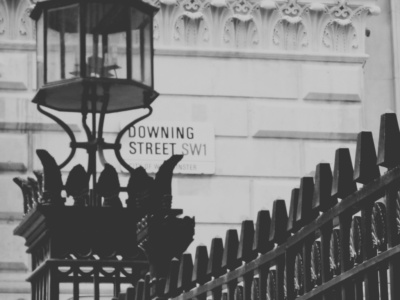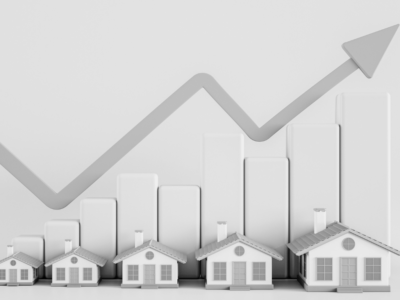Housing Activity
- Monthly house price growth fell to +0.3%, lowest rise since June 2021
- Annual rate of growth remains steady at 9.7%
- Average house price edges up to new record high of £276,759
- Transaction volumes return towards pre-Covid levels
Average price: £276,759
Monthly change: +0.3%
Quarterly change: +3.1%
Annual change: +9.7%
House price growth slowed somewhat at the start of the year, rising by just 0.3% in January, the smallest monthly increase since June 2021.
This followed four consecutive months of gains above 1%, and with annual growth remaining at 9.7%, the average UK house price was little changed, edging up slightly to a new record high of £276,759.
Overall prices remain around £24,500 up on this time last year, and £37,500 higher than two years ago.
Following the peak activity of 2021, transaction volumes are returning to more normal levels.
Affordability remains at historically low levels as house price rises continue to outstrip earnings growth, Russell Galley, Managing Director, Halifax commented.
Galley continued, despite record levels of first-time buyers stepping onto the ladder last year, younger generations still face significant barriers to home ownership as deposit requirements remain challenging.
This situation is expected to become more acute in the short-term as household budgets face even greater pressure from an increase in the cost of living, and rises in interest rates begin to feed through to mortgage rates.
While the limited supply of new housing stock to the market will continue to provide some support to house prices, it remains likely that the rate of house price growth will slow considerably over the next year.
Regions and nations house prices
In keeping with last year, Wales kicked off 2022 as by far the strongest performing nation or region in the UK.
With annual house price inflation of 13.9%, down marginally from December, the average house price fell slightly to £205,253.
Northern Ireland also continues to record strong price growth, with prices up 10.2% on last year, giving an average property value in January of £170,982.
House price growth remains strong in Scotland too, though the annual rate of inflation slowed somewhat to 8.9%, with the average property price edging down to £192,698.
In England, the North West was once again the strongest performing region (up 12.0% year-on-year, average house price of £213,200) and now has the second highest rate of annual growth in the UK.
While London remains the weakest performing area of the UK, the capital continued its recent upward trend with annual house price inflation accelerating for a third straight month to now stand at 4.5%. This was double the rate recorded in December and its strongest performance in over a year.
HMRC monthly property transactions data shows UK home sales increased in December 2021.
UK seasonally adjusted residential transactions in December 2021 were 100,110 – up by 7.6% from November’s figure of 93,050 (up 11.8% on a non-seasonally adjusted basis).
Quarterly transactions (October-December 2021) were approximately 18.5% (seasonally adjusted) lower than the preceding three months (July 2021-September 2021).
Year-on-year, transactions were 20.0% (seasonally adjusted)lower than December 2020 (14.6% lower on a non-seasonally adjusted basis). (Source: HMRC)
Latest Bank of England figures show the number of mortgages approved to finance house purchases rose in December 2021, by 5% to 71,015.
Year-on-year the December figure was 30% below December 2020. (Source: Bank of England, seasonally-adjusted figures)
In the latest RICS Residential Market Survey, a net balance of +9% respondents cited an increase in new buyer demand during December – a fourth consecutive month in positive territory (previously +12%).
New instructions however remain in negative territory for a ninth consecutive month at -14% (-16% previously).
Agreed sales also remain in negative territory, with the latest net balance standing at -13% (compared to -9% previously). (Source: Royal Institution of Chartered Surveyors’ (RICS) monthly report)
Nathan Emerson, Propertymark CEO, comments:
“It will be interesting to see how consumer confidence will be affected by last week’s first back-to-back interest rate rise since 2004 and the added pressures on household budgets that are coming down the line.
But as it stands prices remain inflated by a continued lack of stock, with our member agents reporting that the number of offers they are receiving on properties per month can be well into double figures and that sales are continuing to be agreed at over the asking price.
Lack of stock is an issue across all four UK nations and some agents say they are as much as 40-50% down on last year.
This is backed up by data in our final Housing Market Report of 2021 which showed a month-on-month reduction in the number of new instructions.
Until that trend begins to reverse, I would not expect to see any significant dampening of property prices.”
Commenting on Halifax’s latest House Price Index, Tom Bill, head of UK residential research at Knight Frank said:
“Don’t expect a return to more muted house price growth until supply picks up.
Demand has been unrelenting over the last several months, despite the absence of a stamp duty holiday and the presence of an Omicron surge.
The high level of market valuations requested by prospective sellers in January indicates that supply will pick up as more owners decide now is the time to act and we expect prices to calm down in coming months.
A number of prospective sellers had hesitated due to the distortive effect of a stamp duty holiday and a global pandemic.
Others hit the pause button during the political turmoil of the post-Brexit years, a period that makes the current government appear comparatively stable.
This year could see high demand more evenly matched by supply, which would mean UK house price growth ends 2022 in single-digits.”
Founder and CEO of GetAgent.co.uk, Colby Short, commented:
“There’s not a soul in the land that can state they’re firing fully on all cylinders during January and the UK property market is no different. However, despite what is usually the quietest time of year, the market has still inched forward to post yet another record level of house price growth.
As the cogs start to turn once again, we can expect more of the same and while affordability remains a burning issue, high demand and a lack of stock will ensure house prices remain robust over the coming year.”
Managing Director of Barrows and Forrester, James Forrester, commented:
“We’re now starting to see transactions return to pre-Covid levels but while the outlooks for the year ahead may be less manic, we’re unlikely to see any significant decline in house prices.
This may seem surprising against a backdrop of increased living costs, interest rate increases and the ongoing issue of affordability, but there remains a huge level of motivated buyers fighting it out for what is essentially a limited level of stock.
With these scales unlikely to tip the other way anytime soon, it certainly remains a sellers market and they will continue to secure a very good price for their property when bringing it to market.”
Director of Benham and Reeves, Marc von Grundherr, commented:
“It may seem strange to think of London as the tortoise of the UK property market but while the rate of house price growth has been accelerating at alarming rates in the majority of UK regions, the capital’s housing market has remained far more muted.
However, we’re now seeing something start to stir and London house prices are have climbed at double the rate seen in December alone.
The returning combination of both domestic and foreign demand is helping to rejuvenate the London market and we predict that come the end of the year, the capital will be leading the house price pack once again.”
Walid Koudmani, market analyst at financial brokerage XTB comments:
“While today’s HPI report provided some encouraging signs of recovery with transaction volumes returning towards pre-Covid levels, it also showed average house prices reaching a new record high of £276,759.
Despite the slight slowing of price increases, the issue could exacerbate concerns of a stagnation in the near term as inflationary pressures continue to reduce the spending power of average consumers.”
Comment from Ross Counsell, chartered surveyor and director at GoodMove, on today’s Halifax House Price Index:
“According to January’s Halifax HPI, house price growth has slowed at the start of the year, rising by 0.3% in January.
This marks the smallest monthly increase since June 2021. Saying this however, house prices have still hit a record high of £276,759 – which is around £24,500 higher than this time last year, and £37,500 up from two years ago.
So, what does this mean for the future of the property market in 2022?
Although these statistics show that the property market is continuing to boom, I think it’s fair to say that we can expect house prices to fall this year. With the cost of living going up, many people will find themselves struggling to afford the increasing house prices and will not be looking to buy because of this.
This means there will be less buyer demand which in turn, leads to house prices falling.
For anyone looking to buy a home, I would recommend waiting towards the middle of the year, when we may see the start of a reduction in house prices.”






















Comments